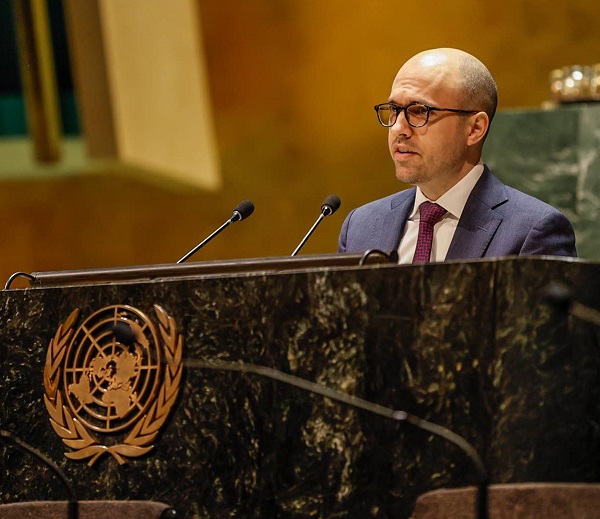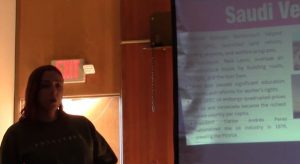World Press Freedom Day remembers 86 journalists killed in 2022
9 min read
Disinformation, hate speech and deadly attacks against journalists are threatening freedom of the press worldwide, UN Secretary-General António Guterres said on Tuesday, calling for greater solidarity with the people who bring us the news.
A.G. Sulzberger, chairman and publisher of The New York Times, called for greater support for independent journalism.
The appeals mark World Press Freedom Day, celebrated annually every May 3 by UN General Assembly resolution in 1993. The focus this year is on the connection between press freedom and overall human rights.
“Freedom of the press is the foundation of democracy and justice. It gives all of us the facts we need to shape opinions and speak truth to power. But in every corner of the world, freedom of the press is under attack,” Mr. Guterres said.
The Secretary-General is away from New York and a video of his message was played during a ceremony in the General Assembly Hall to commemorate the 30th anniversary of World Press Freedom Day.
Prominent journalists and the heads of media and human rights organizations from around the world are attending the event, sharing their experiences and opinions in several panels on subjects such as multilateralism and freedom of expression.
Delivering opening remarks, Audrey Azoulay, Director-General of UN cultural agency UNESCO, which advocates for the protection of journalists, said 2022 was the deadliest year for the profession.
Last year, 86 journalists were killed, mainly outside war zones. “Oftentimes, they were at home with their family,” she said. Hundreds more were attacked or imprisoned.
She said the level of impunity for these crimes sends a chilling message because “the security of journalists is not a matter just for journalists or international organizations. It is a matter for society as a whole.”
Furthermore, reporters are also coming under attack in cyberspace. A 2021 report revealed that three out of four women journalists have been the victim of online harassment, prompting UNESCO to issue recommendations for digital platforms to step up protection.
Ms. Azoulay noted that these challenges are happening at the exact moment when journalists are needed more than ever, as the advent of the digital era has changed the entire information landscape.
Although the Internet has opened new channels for information and expression, it has also provided fertile ground for those seeking to sow disinformation and conspiracy theories.
“We find ourselves at a new crossroads,” she said. “Our current path is leading us away from informed public debates. Away from the very notion of a shared reality on which it depends. A path towards ever more polarization.”
She called for greater action to ensure that information can remain a public good, noting that UNESCO is supporting some 20 countries to develop educational policies in media and information literacy in the digital era.
The agency also organized a major global conference in Paris in February to discuss draft global guidelines for regulating digital platforms, which will be published later this year.
In his keynote address, A.G. Sulzberger, Chairman and Publisher of The New York Times, voiced concern over how threats to press freedom globally ultimately impact multilateralism.
“Without journalists to provide news and information that people can depend on, I fear we will continue to see the unraveling of civic bonds, the erosion of democratic norms, and the weakening of the trust in institutions and in each other that is so essential to the global order,” he said.
Mr. Sulzberger reflected on how the media landscape has evolved since 1993 – a period of optimism characterized by the apparent end of Cold War divisions, the emergence of fledgling democracies, and technological advancements in information and connectivity. News organizations also enjoyed “historic financial strength” and seemed well positioned to inform the public.
He said the moment was short-lived as the same technology that allowed journalists to reach people everywhere also forced many thousands of newspapers to close, and digital outlets that emerged were unable to fill the void, particularly in providing critical local and investigative reporting.
“The internet also unleashed the avalanche of misinformation, propaganda, punditry and clickbait that now overwhelms our information ecosystem, often drowning out credible journalism and accelerating the decline in societal trust,” he said.
Mr. Sulzberger warned that erosion of the free press is almost always followed by democratic erosion.
“And sure enough, this period of weakness for the press has coincided with destabilized democracies and emboldened autocracies. And when democracy erodes, you can be sure that the free press will be the first target,” he said.
“All over the world autocrats and those who aspire to join their ranks have used censorship, media repression, and attacks on journalists to consolidate power. That’s because gaining control of information is essential to gaining control of everything else,” he added.
He provided examples from across the globe, including Russia, where “journalists who dare to even acknowledge the war in Ukraine face long prison terms.”
He also highlighted the case of Wall Street Journal reporter Evan Gershkovich, who was arrested in Yekaterinburg last month for alleged spying, saying the former Times journalist “remains in Russian custody for sham charges and should be released.”
Mr. Sulzberger told UN Member States that countering the worldwide assault on the press will only be solved if they take action.
“For nations with a strong tradition of a free press, including the United States, this means leaders standing up to secure legal protections for independent reporters and their sources,” he said.
“For nations where reporting the truth remains perilous, this means the international community must make clear that we’ll call out and punish the crackdowns and attacks against journalists no matter where they occur.”
He further emphasized the need to address the challenges facing the press, including developing clear financial models for sustaining independent journalism.
“We still need a commitment from the digital giants to elevate independent journalism and ensure it stands apart from untrustworthy information on their platforms,” he added. “And we still need more of the public to value independent journalism enough to support it with their time, their money and their trust.”
The full keynote address follows.
New York Times publisher A.G. Sulzberger delivered the opening remarks at the World Press Freedom Day conference hosted by UNESCO.
It’s heartening to be here with so many great journalists and so many more from around the world who stand up for journalists and the rights that make our work possible. You have my admiration and gratitude, especially those of you fighting for the public’s right to know in places where press freedom remains dangerously contested.
Thirty years ago, the U.N. General Assembly established World Press Freedom Day as an opportunity to bring the international community together each year to recognize the importance of press freedom and the foundational role journalists play in supporting human rights and free societies.
I’m here to tell you today that this vision is at great risk. All over the world, independent journalists and press freedoms are under attack. Without journalists to provide news and information that people can depend on, I fear we will continue to see the unraveling of civic bonds, the erosion of democratic norms and the weakening of the trust — in institutions and in each other — that is so essential to the global order.
But let’s rewind to that moment of great optimism 30 years ago. The fears, divisions and dangers of the Cold War had seemingly subsided. The emergence of new, if fragile, democracies promised expanded freedoms for millions. Technological advancements hinted at a way of making people all over the world more informed and connected. And news organizations, then enjoying historic financial strength, seemed well positioned to provide trustworthy information for a public eager to understand and engage with the broader world.
But rather than heralding a new global embrace of journalism, this moment proved to be a short-lived highpoint. The same technology that gave journalists the opportunity to reach people everywhere also eroded the business model of news, forcing many thousands of newspapers around the world to shutter. The digital outlets that emerged in their place were unable to fill the void, particularly in providing the local and investigative reporting that society depends on. The internet also unleashed the avalanche of misinformation, propaganda, punditry and clickbait that now overwhelms our information ecosystem, often drowning out credible journalism and accelerating the decline in societal trust.
When the free press erodes, democratic erosion almost always follows. Sure enough, this period of weakness for the press has coincided with destabilized democracies and emboldened autocracies.
And when democracy erodes, you can be sure the free press will be the first target. All over the world, autocrats — and those who aspire to join their ranks — have used censorship, media repression and attacks on journalists to consolidate power. That’s because gaining control of information is essential to gaining control of everything else.
In countries where press freedoms were strong — including the United States — journalists now face systematic campaigns to undermine their credibility, followed by attacks on the legal protections that safeguard their work. In countries where press freedoms were already weak, journalists now face surging levels of violence, detention and harassment. More journalists are being killed for their work and the number of imprisoned journalists has now reached a new record.
Spin a globe and you’ll find examples of these trends. In China, journalists are surveilled, intimidated and jailed. In Hungary, the government has rewritten laws to gain near-total control over the press. In Egypt the government has used security services to buy up outlets and block uncooperative news sites. In Nicaragua, sustained crackdowns have forced journalists into exile. In India, authorities have raided newsrooms and treated journalists essentially as terrorists. And in Russia, journalists who dare to even acknowledge the war in Ukraine face long prison terms. Here I want to draw attention to my former Times colleague Evan Gershkovich, now a reporter at The Wall Street Journal, who remains in Russian custody for sham charges and should be released.
The cumulative story — as you’ll hear from panelists today — is of a worldwide assault on journalists, their work and the public’s right to know. And it will only be solved if the nations that make up this body take action.
For nations with a strong tradition of a free press, including the United States, this means leaders standing up to secure legal protections for independent reporters and their sources.
For nations where reporting the truth remains perilous, this means the international community must make clear that it will call out and punish the crackdowns and attacks against journalists, no matter where they occur.
These steps alone will not address the challenge facing the press. We still need a clear financial model for sustaining independent journalism. We still need a commitment from the digital giants to elevate independent journalism and ensure it stands apart from untrustworthy information on their platforms. We still need more of the public to value independent journalism enough to support it with their time, money and trust.
I make these entreaties today with little optimism. I’ve repeated this message to global leaders for more than six years — both in personal meetings and in large gatherings such as this. And yet the climate for press freedom has only become darker.
But, at the same time, it’s impossible not to be inspired by the ways journalists continue to respond to these challenges. People like Maria Ressa, Jose Ruben Zamora, Pape Alé Niang and Austin Tice. Or to feel compelled to carry on the work of people like Jamal Khashoggi, Daphne Caruana Galizia, Anna Politkovskaya.
In an era of misinformation, countless journalists such as these around the world are fighting for the truth. In an era of propaganda and strongmen, they’re relentlessly pursuing accountability. And in an era of polarization, they’re fostering understanding.
Truth. Accountability. Understanding. These are powerful gifts to the world.
Thirty years ago, the U.N. established World Press Freedom Day in recognition of the unbreakable connection between journalists being free to seek the truth and share it with the public — and the health of the societies they serve.
Today I ask the collected global leaders who make up the United Nations to ensure journalists everywhere can continue their essential work without fear of intimidation and reprisal. For it is their work that helps make your people freer, your societies more just, and the entire world better equipped to tackle its biggest challenges.






